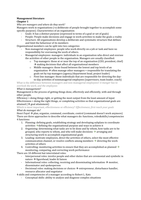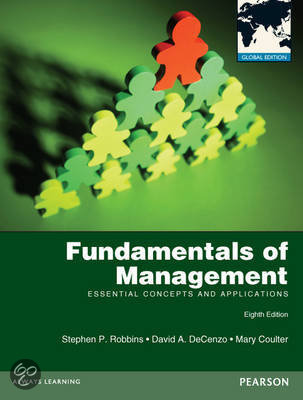Management literature
Chapter 1
Who are managers and where do they work?
Managers work in organisations (=a deliberate of people brought together to accomplish some
specific purpose). Characteristics of an organisation:
- Goals: It has a distinct purpose (expressed in terms of a goal or set of goals)
- People: People make decisions and engage in work activities to make the goals a reality
- Structure: All organizations develop a deliberate and systematic structure that defines
and limit the behaviour of its members
Organizational members can be split into two categories:
- Non-managerial employees: people who work directly on a job or task and have no
responsibility for overseeing the work of others.
- Managerial employees: managers: individuals in an organisation who direct and oversee
the activities of other people in the organisation. Managers are usually classified:
o Top managers: those at or near the top of an organisation (CEO, president, chief)
making decisions that affect all organisational members
o Middle managers: those found between the lowest and top levels of an
organisation often manage other managers + responsible for translating the
goals set by top managers (agency/department head, project leader)
o First-line manager: those individuals that are responsible for directing the day-
to-day activities of nonmanagerial employees (supervisors, team leader, coach)
What is the difference between managers and non-managerial employees? A manger has to
overlook the work, and the employees
What is management?
Management is the process of getting things done, effectively and efficiently, with and through
other people.
Efficiency = doing things right, or getting the most output from the least amount of input
Effectiveness = doing the right things, or completing activities so that organizational goals are
attained ( goal attainment)
Which is most important, effectiveness or efficiency? Effectiveness; first reach your goals
What do manager do?
Henri Fayol plan, organize, command, coordinate, control (command doesn’t work anymore)
There are three approaches to describe what managers do: functions, roles&skills/competencies
4 functions:
1. Planning: defining goals, establishing strategy and developing subplans to coordinate
activities defining the organizational purpose and ways to achieve it
2. Organizing: determining what tasks are to be done and by whom, how tasks are to be
grouped, who reports to whom, and who will make decisions arranging and
structuring work to accomplish organizational goals
3. Leading: motivate employees, direct the activities of others, select the most effective
communication channel, or resolve conflicts among members directing the work
activities of others
4. Controlling: monitoring activities to ensure that they are accomplished as planned
monitoring, comparing, and correcting work performance
There are 10 different but interrelated roles:
- Interpersonal roles: involve people and other duties that are ceremonial and symbolic in
nature figurehead, leader & liaison
- Informational roles: collecting, receiving and disseminating information monitor,
disseminator and spokesperson
- Decisional roles: making decisions or choices entrepreneur, disturbance handler,
resource allocator and negotiator
4 skills and competencies of a manager according to Robert L. Katz
- Conceptual skills: ability to analyse and diagnose complex situations





